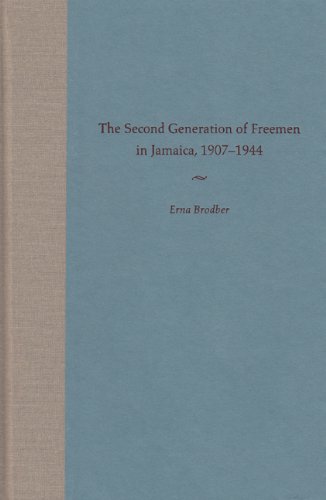Items related to The Second Generation of Freemen in Jamaica, 1907-1944

One of the most acclaimed novelists in the Caribbean, Erna Brodber tells us in this history about the everyday life of African-Jamaicans born at the turn of the 20th century, the second generation of freemen in Jamaica and the first to be born free. Both eloquent and intimate, the book is based largely upon a series of 90 rare and detailed interviews Brodber conducted with people who lived in Jamaica from around 1900 to the 1970s, and it reveals their aspirations, struggles, defeats, and victories from childhood on. Brodber focuses on their family lives--often marked by separations--and on their opportunities for education, travel, courtship, and religious practice. Her interviews expose the limited employment options of black Jamaicans in the early 20th century and document their political situation and their long road to suffrage, finally granted in 1944. Brodber also records how they were affected both by man-made disasters, such as the World Wars, and by natural ones, including several hurricanes. Their stories reveal the problem-solving devices they inherited from their ancestors and also the existence of "ancestral anger," an emotion and attitude that finds expression in contemporary Jamaican society. The testimonies are placed in the wider context of British colonial policy and the political economy of the island and bring to life the people who often figured only as statistics in censuses and colonial governors’ dispatches. Using oral accounts and archival sources in Jamaica and Great Britain, the work offers a "bottom up" view of Jamaican society, a corrective to much of the past historiography that has been limited by the "great man" approach to scholarship. With its colorful accounts of tea meetings and marches and its recital of rhymes, songs, and proverbs, the book also offers a treasury of folk materials.In language that will engage the general reader, this talented writer presents a new perspective on the impact of slavery in Jamaica; it also will be valuable to historians, sociologists, anthropologists, and political scientists.
"synopsis" may belong to another edition of this title.
Book Description:
"Erna Brodber puts a face on Jamaican history, presenting (often in the inimitable voices of ordinary Jamaican folk) the story of slavery and its aftermath. [Her] interviews . . . invite comparison with the WPA interviews with former slaves here in America. The texts of these interviews are even more valuable because of Brodber's expertise in Jamaican history and culture, the extensiveness of the interviews, and her sensitive and brilliant transcriptions of the language of her speakers."--Daryl Cumber Dance, University of Richmond One of the most acclaimed novelists in the Caribbean, Erna Brodber tells us in this history about the everyday life of African-Jamaicans born at the turn of the 20th century, the second generation of freemen in Jamaica and the first to be born free. Both eloquent and intimate, the book is based largely upon a series of 90 rare and detailed interviews Brodber conducted with people who lived in Jamaica from around 1900 to the 1970s, and it reveals their aspirations, struggles, defeats, and victories from childhood on. Brodber focuses on their family lives--often marked by separations--and on their opportunities for education, travel, courtship, and religious practice. Her interviews expose the limited employment options of black Jamaicans in the early 20th century and document their political situation and their long road to suffrage, finally granted in 1944. Brodber also records how they were affected both by man-made disasters, such as the World Wars, and by natural ones, including several hurricanes. Their stories reveal the problem-solving devices they inherited from their ancestors and also the existence of "ancestral anger," an emotion and attitude that finds expression in contemporary Jamaican society. The testimonies are placed in the wider context of British colonial policy and the political economy of the island and bring to life the people who often figured only as statistics in censuses and colonial governors’ dispatches. Using oral accounts and archival sources in Jamaica and Great Britain, the work offers a "bottom up" view of Jamaican society, a corrective to much of the past historiography that has been limited by the "great man" approach to scholarship. With its colorful accounts of tea meetings and marches and its recital of rhymes, songs, and proverbs, the book also offers a treasury of folk materials.In language that will engage the general reader, this talented writer presents a new perspective on the impact of slavery in Jamaica; it also will be valuable to historians, sociologists, anthropologists, and political scientists.
About the Author:
Erna Brodber has written several works of nonfiction, including Perceptions of Caribbean Women and The Continent of Black Consciousness: On the History of the African Diaspora from Slavery to the Present Day. She is also the author of three novels, including Myal, which was the 1989 Caribbean and Canadian regional winner of the Commonwealth Writers Prize. She is currently a senior lecturer in sociology, psychology, and social work at the University of the West Indies.
"About this title" may belong to another edition of this title.
- PublisherUniversity Press of Florida
- Publication date2004
- ISBN 10 0813027594
- ISBN 13 9780813027593
- BindingHardcover
- Edition number1
- Number of pages240
(No Available Copies)
Search Books: Create a WantIf you know the book but cannot find it on AbeBooks, we can automatically search for it on your behalf as new inventory is added. If it is added to AbeBooks by one of our member booksellers, we will notify you!
Create a Want